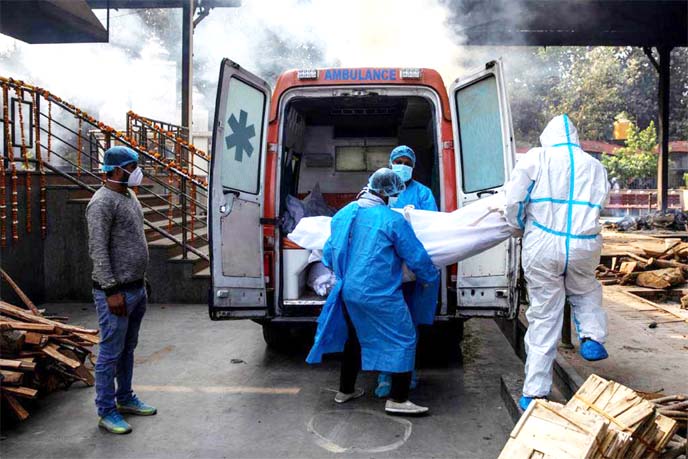
Al Jazeera News :
Delhi’s Covid-19 deaths rose by a record high on Thursday and it also reported the most number of infections in India, an increase attributed to the city’s toxic air and a lack of physical distancing in public places around a major festival.
While daily case additions have come down significantly in the country as a whole since a mid-September peak, the capital city of 20 million people is going through its worst phase in the pandemic.
Delhi late on Thursday reported 104 new deaths and 7,053 new infections. Data from the federal health ministry early on Friday showed that infections in the country rose by 44,789 in the past 24 hours, taking the total to 8.73 million, only behind the US tally.
India’s deaths increased by 547 to 128,668.
As Delhi’s cases rise in its third-wave of infections, many hospitals have already run out of intensive care beds and even normal COVID-19 beds are getting occupied fast.
On the request of the local government, the Delhi High Court on Thursday ordered the city’s private hospitals to reserve 80 percent of their critical-care beds for patients infected by the novel coronavirus.
The federal government has asked Delhi to prepare resources to handle cases of up to 15,000 a day during the winter season when pollution peaks in the city and respiratory issues jump.
The air is only likely to worsen on the weekend due to thousands of firecrackers ignited during the Hindu festival of lights, Diwali. Its residents have already swarmed markets to buy gifts for family and friends.
Doctors say PM2.5 pollutants, fine particles found in high concentration in Delhi’s air, can break the nasal passage barrier, weaken the inner lining of lungs and facilitate the spread of coronavirus infection.
“Painful,” tweeted Arvinder Singh Soin, a surgeon in a top hospital near Delhi, referring to Delhi hospitals getting flooded with COVID-19 patients. “And the festive surge has only just begun.”
Delhi’s Covid-19 deaths rose by a record high on Thursday and it also reported the most number of infections in India, an increase attributed to the city’s toxic air and a lack of physical distancing in public places around a major festival.
While daily case additions have come down significantly in the country as a whole since a mid-September peak, the capital city of 20 million people is going through its worst phase in the pandemic.
Delhi late on Thursday reported 104 new deaths and 7,053 new infections. Data from the federal health ministry early on Friday showed that infections in the country rose by 44,789 in the past 24 hours, taking the total to 8.73 million, only behind the US tally.
India’s deaths increased by 547 to 128,668.
As Delhi’s cases rise in its third-wave of infections, many hospitals have already run out of intensive care beds and even normal COVID-19 beds are getting occupied fast.
On the request of the local government, the Delhi High Court on Thursday ordered the city’s private hospitals to reserve 80 percent of their critical-care beds for patients infected by the novel coronavirus.
The federal government has asked Delhi to prepare resources to handle cases of up to 15,000 a day during the winter season when pollution peaks in the city and respiratory issues jump.
The air is only likely to worsen on the weekend due to thousands of firecrackers ignited during the Hindu festival of lights, Diwali. Its residents have already swarmed markets to buy gifts for family and friends.
Doctors say PM2.5 pollutants, fine particles found in high concentration in Delhi’s air, can break the nasal passage barrier, weaken the inner lining of lungs and facilitate the spread of coronavirus infection.
“Painful,” tweeted Arvinder Singh Soin, a surgeon in a top hospital near Delhi, referring to Delhi hospitals getting flooded with COVID-19 patients. “And the festive surge has only just begun.”

